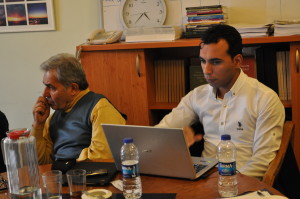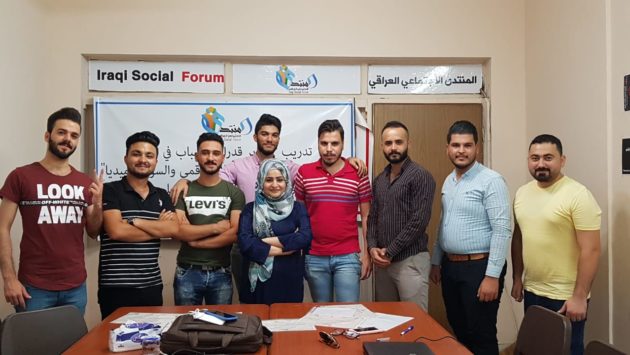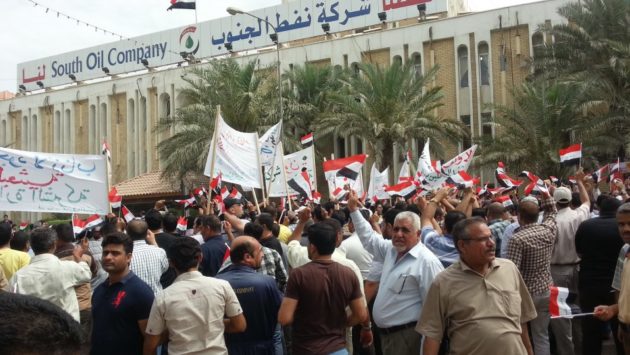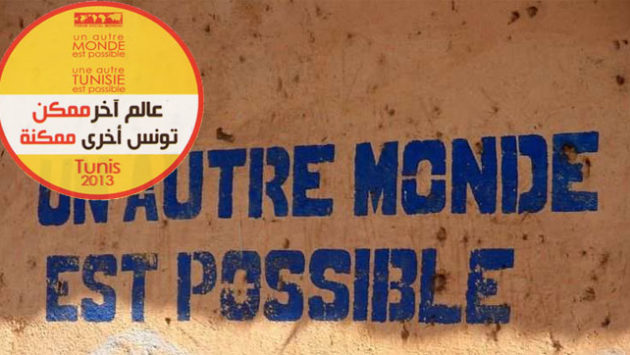Iraqi unions and the opportunity to play a key role in social forums
Wesam Chasib Oudah (Iraq Program Manager, Solidarity Center), February 2016.
Iraqi unions and the signs of hope
The load of challenges that Iraqi unions confronted and still do – such as those in administrative, organizing, legal, economic, social, and security perspectives – is obvious to everyone. But in spite of these challenges, unions were able to continue performing their functions and to accomplish great achievements. The most recent significant achievement was the unions’ effective participation in legislating the new labor code number 37 of 2015 after a long struggle that lasted more than 10 years. The law is compatible with international labor standards and recent developments in the labor market.
For the first time in Iraq’s history, unions collaborated together with their social partners (government officials and employers) in drafting and amending articles of the new law. They worked side by side with the parliamentary labor committee and with the support of Iraqi civil society organizations, and international union confederations and centers. At the top of that list comes the ILO, ITUC, and the Solidarity Center. This experience that Iraqi trade unions successfully went through is a valuable lesson for other sectors of Iraq’s civil society and the nation’s population in general. The unions proved that making history is in the hands of people and is accomplished through determination and hard work. This achievement will be an important step towards positive changes in the near, and even the far future.
Steps to success
Unions’ success in passing the labor law has definitely boosted their self-confidence to achieve more gains in terms of labor legislation, and that will surely reflect on the performance on the ground by increasing the impact of labor organizing campaigns and recruiting potential members into unions. The most remarkable outcome after the issuance of the new labor law, is that Iraqi trade union federations are now working together as one team and that itself may lead to a joint-union effort in the near future where they will all unite in a single structured federation; or if they remain as separate federations, there will be more harmony and understanding among them to achieve their mutual objectives.
One of the results of the collaborative effort of unions is the progress and continuation in issuing and amending labor legislation. They have been working hard for the last two years to develop a draft of the union rights and freedoms law, and they got to advanced stages in the legal format after setting the general boundaries of the draft and specifying what content it should include to guarantee union freedoms that are in line with international labor conventions on that topic, especially ILO convention number 87 of 1948, on union freedoms and rights.
Unions continue to meet in Baghdad on a weekly basis to put the final touches on the union freedoms and rights law draft to present to Ministry of Labor and Social Affairs [MoLSA] and the Iraqi parliament as part of the commitment of the groups (workers, employers and government) that was announced in the union freedoms conference that was organized by the Solidarity Center in late 2015 in Erbil. The conference was attended by representatives from all Iraqi trade union federations, government, parliament, human rights supreme commissioner, the ILO and the ITUC. Meanwhile the federations in Basra and Kurdistan contribute to the joint effort at every stage by giving suggestions and opinions with regards to the draft.
On the other hand, Iraqi trade unions were successful in representing workers of the public sector and standing by the struggle of workers in the industrial sector demanding workers’ rights, especially in the self-financed companies of the Ministry of Industry and Mines. They were part of all the protests and demonstrations, and negotiations in that sector. They also submitted studies and proposals aiming to bring about a revitalization in Iraq’s industry and to guarantee decent work conditions to Iraqi workers associated with real job security, and the total rejection of the sale or privatization of the Public Corporations. The unions’ success in that effort also included the sectors of electricity, ports, oil, railways, and ground transportation, and other sectors before the labor protests turned into public protests demanding economic, social, and political reforms and to fight administrative and financial corruption, to guarantee freedoms and build a civil state that rejects all sectarian quotas, along with many other public demands.
Everything mentioned above shows the magnitude of Iraqi working class and union efforts and initiatives in that direction. They played an essential role in establishing social reconciliation and promoting social justice. The final report of the discussion session of Iraqi trade unions at the Iraqi social forum that took place on the 3rd of October, 2015 (attached herewith) clearly shows the effort of unions in that direction, their vision for Iraq’s future in general, and related recommendations they were keen to express.
Unions’ needs going forward
The current urgent needs of Iraqi trade unions are:
. A continued effort to develop labor legislation that has not yet been passed, especially the union rights and freedoms’ law, as well as the social security and retirement (pension) law. Unions are still working to develop a proposed draft for the union freedoms’ law to present to MoLSA and the Iraqi parliament in the first quarter of this year. And in regards to the draft of the social security and retirement (pension) law, it has not yet passed from the “Shura” council to the parliament.
. With the issuing of the new labor law, there is an urgent need to raise awareness and educate members and Iraqi workers on all the legal protections and rights, and privileges that the law legally guarantees to workers and their organizations. Also, there’s a need to develop training courses for leadership of unions and labor federations on mechanisms they should follow to make sure the law’s provisions are correctly implemented, violations are jointly documented by labor inspection teams, and to address and resolve the tremendous violations at various work sites.
. Unions are in need of specialized training programs on how to manage campaigns, for participants from the rank and file and youth as much as possible. Trainers in those programs should focus on two tasks:
a) Planning and managing advocacy campaigns around protecting workers rights in general, and especially women and youth. As well as managing campaigns where the goal is to recruit and organize potential union members, and expand the size of their union organizations.
b) To provide guidance and necessary training to other members of sector unions on the topics mentioned in paragraph (a), above.
. Unions need now more than ever, to focus on economic and social issues, and their impact on workers, yet to move from the stage of focusing on internal organizing strategies to the stage of conducting studies on the economic and social status and how all that effects workers, and to propose reasonable solutions and eventually be a part of the implementation of those proposals, or at least overseeing their implementation. Unions are capable of playing an important role in that direction, through their relationships with ministries and parliamentarian committees.
. Unions need specialized training on how to rapidly increase their organizations’ revenue, and methods to invest those resources and keep them going to make the unions eventually able to conduct the activities they have always been planning for, but for which financial resources have always been the obstacle to implementation.
Ideas for the Social Forum
Why is it crucial to incorporate unions with Social Forums?
It is not only important that unions attend social forums but it’s crucial that they become key players, because among unions’ objectives is to address social, economic and political issues and to participate in sketching the general policies of countries jointly with other social dialogue partners. Therefore, unions are more than just routine social organizations , they have a wide reach to actively mobilize in various directions (with government, employers, and their members), taking advantage of their large membership and the presence of their representatives in most work sites, if not all in ideal circumstances.
Establishing the social forum in Iraq happened at a time that Iraq is undergoing huge and complicated security, economic, social and political challenges, and that gave the forum a crucial role being an open forum for all spheres of society to meet (youth, women, legal, environmental, media related), as well as civil society organizations, union organizations and networks, etc. to discuss and address various issues of mutual interest, and to tackle the concepts of democracy, to draft proposals and freely exchange their experiences, and also to progress from the stage of protest on certain issues to the stage of discussing and analyzing the economic and social policies, and proposing reasonable solutions for each and every issue. The forum might also take another dimension as a platform to launch campaigns aiming to mobilize the above mentioned categories or others, on a certain topic that’s related to the economic, social or even political status.
In an unstable security status such as in Iraq, it becomes difficult to organize large social forums, notwithstanding the newness of the experience, but in spite of that the first and second rounds of the Iraqi social forums showed clear indications that it is possible that the forum can even further progress in its activities to a higher level than the first two rounds, and to cover a wider span of categories, and to activate joint activities with organizations in terms of participation and exchange of experiences.
Before doing that, the forum organizers need to consider the following points:
. How do the organizations and involved categories vision the forum? Do they fully understand the objectives of establishing social forums, and what are the anticipated results that may be achieved through that? And what is the notable progress between the first and last rounds of the global economic forums?
. How do organizations and involved individuals generally see the Iraqi forum? In terms of the structure and content.
. Are the affected spheres of society well represented in the forum? And are there any other categories that are left out? How could those be reached and incorporated into the forum?
. Are the different groups involved in the forum active enough? And are they able to practically contribute to improve the forum?
. What are the future plans of the forum in Iraq, in terms of geographical expansion so that it equally covers more governorates in the north, south and in the central regions of the country? And not only in Baghdad, the capital.
. How do the forum organizers assess the role of the media in covering the forum’s events and activities at the time where the main focus of the media is on political and security issues in the country? Was it successful in delivering the forum’s message to the community? Media is the cornerstone of the forum and it is an essential factor to its success to accomplish its goals.
It is common that the vision towards forums takes two directions, and they are:
. First direction: some feel that forums are just a space for them to meet to exchange their experiences and activities in the presence of other groups and sectors, aiming to discuss and come up with proposals on certain topics. People who carry that kind of perspective might believe that organizers of such forums are individuals who have an experience in organizing large gatherings and conferences, for investment motives.
. Second direction: See the forum as an opportunity to unite forces, mobilize the different spheres of society, unions, and other organizations, around social issues of a mutual interest. This group believes in shifting from the stage of discussing issues to an alternative of face-to-face confrontation to make a change.
Throughout my participation in the previous two rounds, I noticed that the precise impression of unions leans towards the first vision, and an increase in the participation of unions and their active collaboration would be compromised without a serious convert from the first vision of the forum. Unions, according to challenges and successes they went through, lean towards activities that enable them to achieve significant change in the economic and social reality. That is not impossible for Iraqi trade unions to do when they are capable of doing so much for just a few workers. Then what could they achieve when it comes to Millions of workers and their families?
The special session on the role of unions in social reconciliation, freedoms and social justice that was part of the Iraqi social forum in its second round is definite proof of what we mentioned above. The session’s conclusion made important recommendations that go further than the reality of unions representing their members, conclusions that get to the level of brainstorming on the economic and social future of the country, identifying actual problems, and proposing reasonable solutions, from their perspective. So, here we need to precisely identify the means and actual mechanisms that help unions to expand their participation and step forward to a more advanced stage and shift from just discussions and proposals to a stage where they work practically on the execution of those proposals with decision makers in the country, and eventually make an actual change.
Finally, I believe that the forum and through its national committee needs to refine its strategies for dealing with trade unions, and to consider that as a top priority. The ultimate goal is that the forum’s message clearly reaches Iraqi unions in a more transparent manner.
Speech given at the ISF-ICSSI Joint Strategy Workshop on 11-14 February 2016





